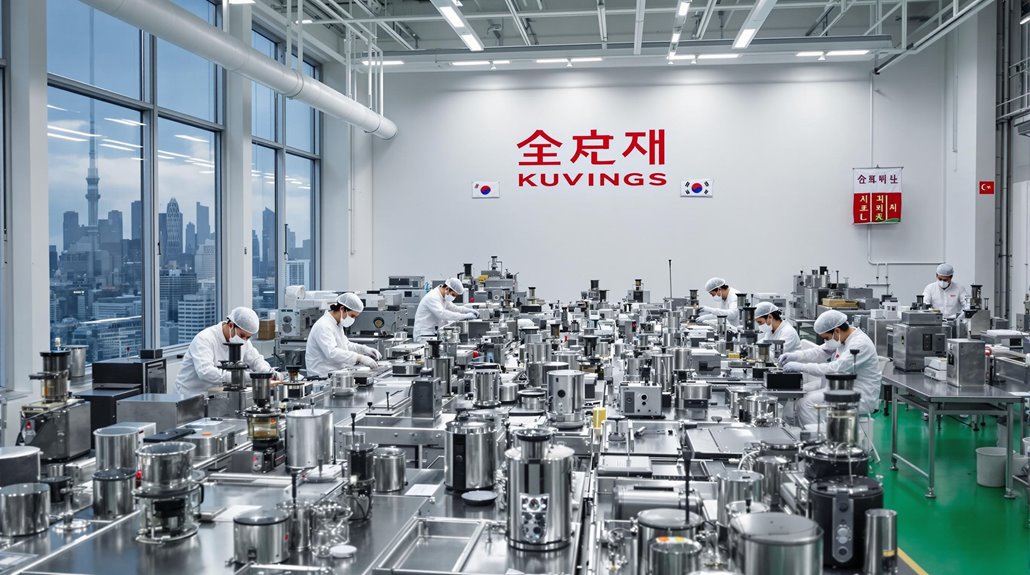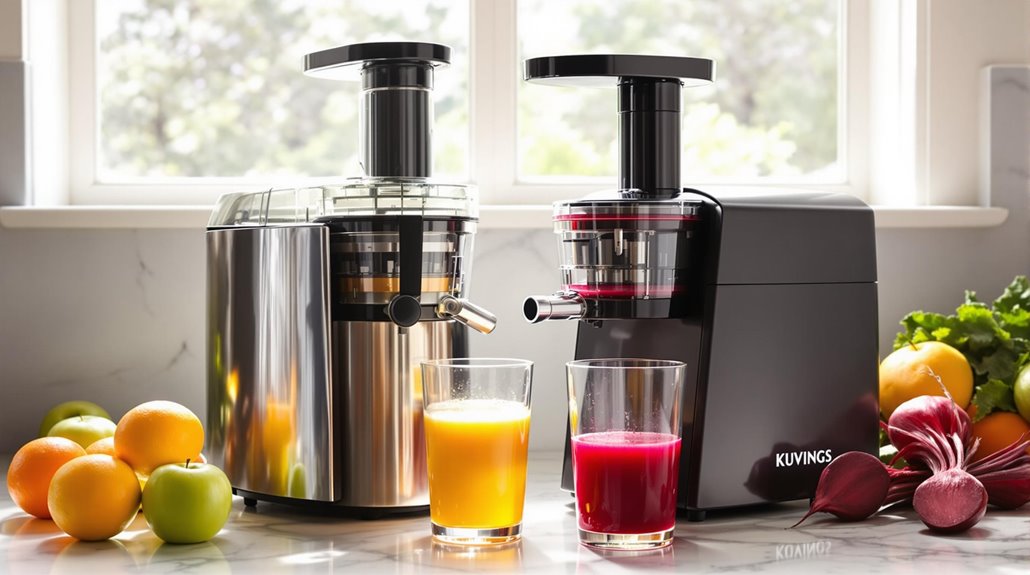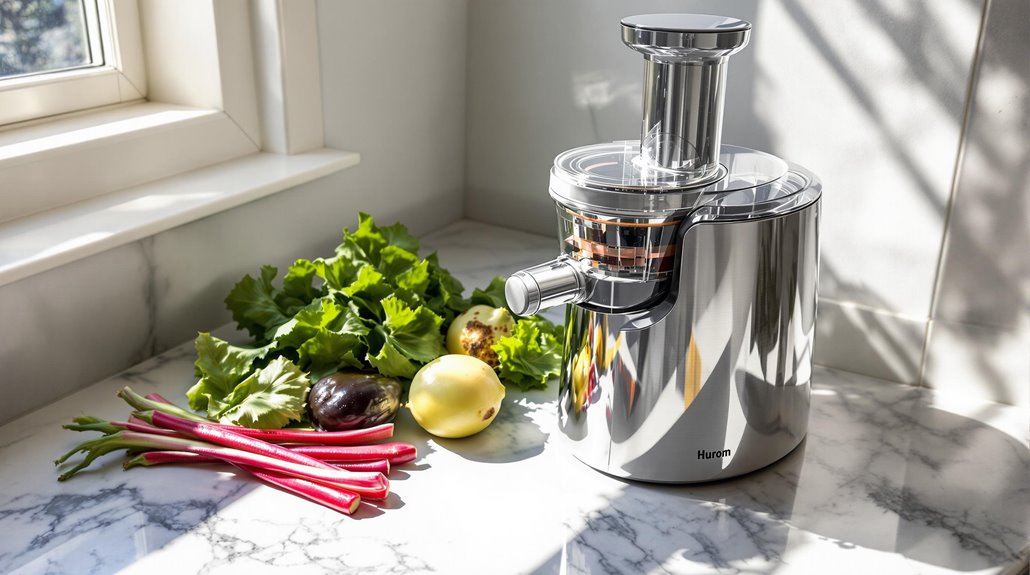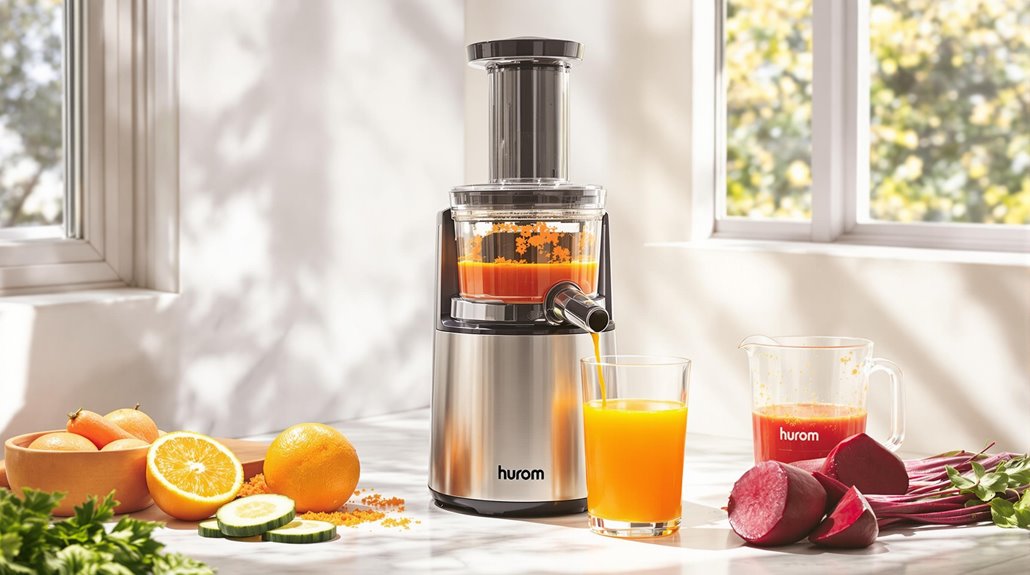Are Hurom and Nama the Same Company?
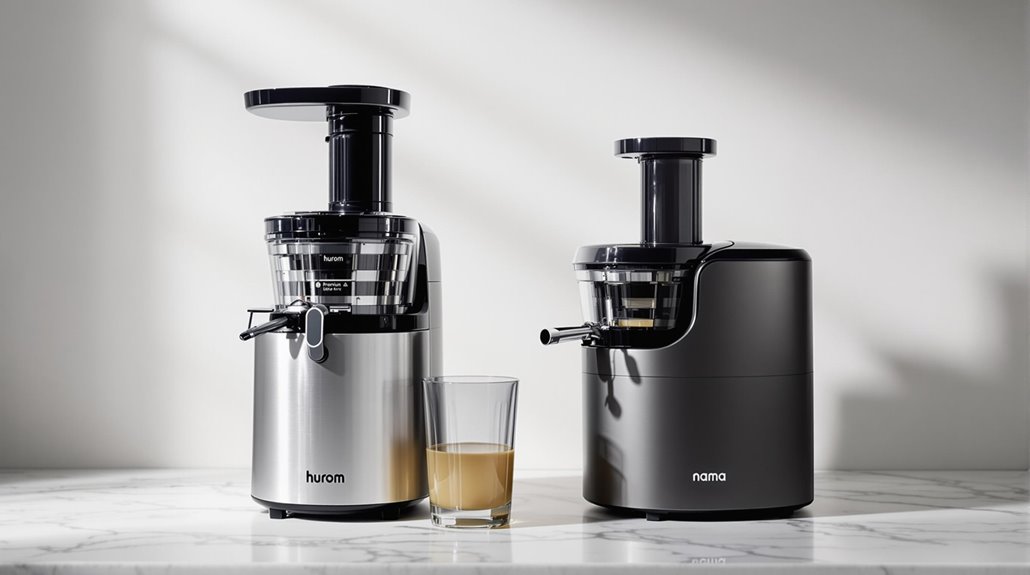
Hurom and Nama aren't the same company - they have distinct origins and headquarters. Hurom started in South Korea in 1974, while Nama launched in Britain in 2012. However, you'll notice striking similarities in their juicer designs, engineering approaches, and manufacturing processes, particularly in their vertical slow-juicing technology. Both companies compete in the premium juicer market but maintain separate brand identities. Their fascinating connection reveals an interesting story about modern appliance manufacturing.
Company Origins and Background
Despite some consumer confusion about their relationship, Hurom and Nama are entirely separate companies with distinct histories and origins. Hurom, founded in South Korea in 1974, has spent a long time perfecting their slow juicers, which work fast to extract much juice from leafy greens and produce a wide variety of green juice recipes. They're also known for their versatile machines that can make ice cream and orange juice while being easy to clean.
Nama, on the other hand, is a relatively newer British company that emerged in 2012. They've focused on developing cold-pressed juicers and have created their own unique juice recipe collection. One thing that sets them apart is their specialized approach to cold-pressed technology. If you leave a comment on either company's website, you'll notice they maintain separate brand identities. Both companies entered the market long after the revolutionary twin gear juicer was invented by Mr. Kim in 1993, which changed how nutrients and enzymes could be preserved during the juicing process.
Design and Engineering Similarities
Several striking design similarities between Hurom and Nama juicers have led consumers to question their manufacturing origins. When you look at both brands side by side, you'll notice their shared vertical, low-speed auger design and distinctive chrome-plated finish. These similarities are particularly evident in the Hurom H 330p and Nama J2 models, which feature nearly identical juicing mechanisms and pulp separation systems.
The technical specifications and build quality between the two brands are remarkably similar, as confirmed by numerous user reviews. You'll also find comparable pricing structures, warranty terms, and accessory options across both product lines. These parallel features strongly suggest that Hurom and Nama either share manufacturing facilities, operate from the same supply chain, or maintain some form of business relationship in their production processes.
Both companies utilize vertical gear juicers which are considered more revolutionary than traditional horizontal designs, offering enhanced efficiency and modern aesthetics.
Manufacturing Processes and Facilities
The manufacturing footprint of Hurom and Nama reveals persuasive evidence of shared production capabilities. When you examine their production capacity and operational infrastructure, you'll notice striking parallels that suggest a unified manufacturing approach.
Consider these key manufacturing indicators:
- Both brands leverage similar component sourcing networks and supply chain management systems
- Their quality control protocols and production line setups display exceptional consistency
- The facilities' output capacity and technical specifications align closely across product lines
You'll find that investigating their manufacturing facilities uncovers significant overlaps in equipment, processes, and quality standards. While both companies maintain distinct brand identities, their production methods and facility characteristics point to a potentially integrated manufacturing relationship, suggesting shared resources and proficiency in juicer production. Both manufacturers focus on creating masticating juicer designs that operate at slower speeds to maximize nutrient retention and juice quality.
Product Lineup Comparison
Moving from manufacturing to actual products, a side-by-side comparison of Hurom and Nama's juicer lineups reveals both notable similarities and key differences. You'll find that Hurom offers a broader range of juicers, including vertical slow juicers, horizontal models, and citrus-specific units. Their product innovations focus on specialized extraction methods for different types of produce.
Nama, being newer to the market, maintains a more focused lineup centered on their signature J2 cold press juicer and the smaller Vitality model. While both companies emphasize critical slow-pressing technology, Nama's products feature modern touchscreen interfaces and simplified assembly. You'll notice that Hurom tends to release multiple variations of successful models, while Nama concentrates on perfecting fewer core products with regular software updates and modular components.
Brand Identity and Market Positioning
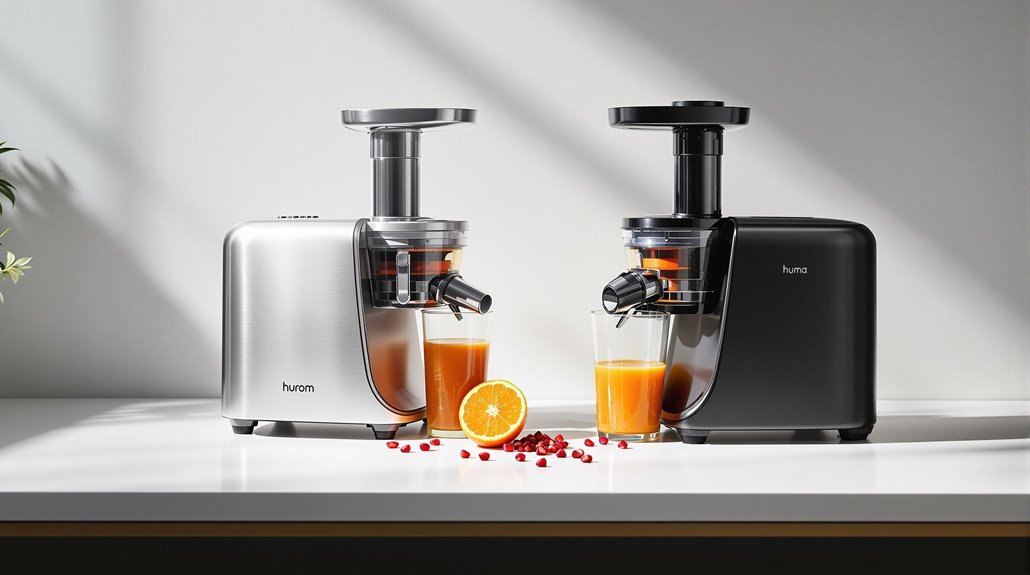
Distinct brand identities set Hurom and Nama apart in significant ways. As a South Korean company with extensive global expansion, Hurom has established itself as a leader in the slow juicer market with years of proficiency and worldwide recognition.
In contrast, Nama positions itself as a Canadian innovator focused primarily on North American consumers seeking premium cold-press juicing solutions.
When you examine their market positioning, you'll notice three key differences:
- Geographic focus: Hurom maintains a strong international presence, while Nama concentrates on North American markets
- Brand heritage: Hurom utilizes its established South Korean engineering reputation, whereas Nama emphasizes Canadian innovation
- Target audience: Hurom appeals to a broader global customer base, while Nama targets premium segment buyers in North America
Warranty and Customer Support Analysis
When evaluating Hurom and Nama's after-sales support, noteworthy differences emerge in their warranty coverage and customer service approaches. You'll find that Hurom offers a more extensive 10-year motor warranty, while Nama provides a 2-year limited warranty.
Warranty considerations extend beyond just coverage periods. Hurom's dedicated customer support team has built a reputation for responsive assistance and efficient warranty claim processing. They've also invested in all-encompassing user resources, including detailed manuals and troubleshooting guides.
In contrast, Nama's customer support experience can be less consistent, with users reporting varying levels of service quality and more challenging warranty claim procedures.
These distinctions in after-sales support and warranty coverage could greatly impact your long-term satisfaction with either brand, making them pivotal factors in your purchasing decision.
Performance and Technical Specifications
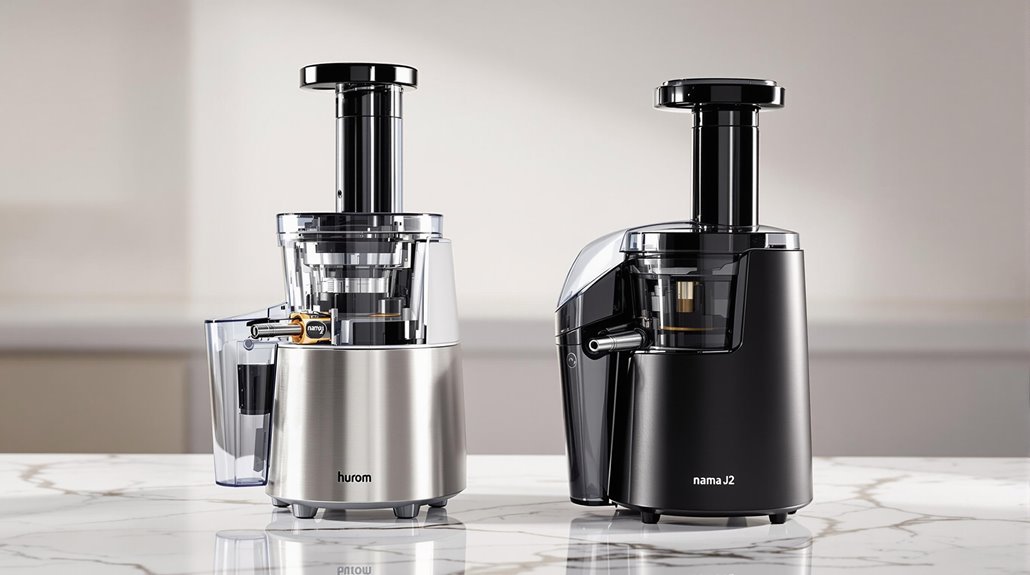
Technical performance comparisons between the Hurom H 330p and Nama J2 reveal striking similarities in their core capabilities. When conducting a juice quality comparison between these models, you'll find they perform almost identically across various produce types.
Consider these key performance indicators:
- Both machines extract juice with comparable efficiency from fruits like watermelon mint ginger, key lime, and papaya orange combinations
- They demonstrate equal effectiveness when processing leafy greens, producing similar juice yields
- The pulp dryness levels are virtually identical, indicating matching extraction capabilities
The only notable difference lies in noise levels, with the Hurom H 330p operating slightly quieter than the Nama J2. These parallels in performance specifications suggest both machines are engineered with similar design principles and quality standards.
Consumer Experience and Reviews
Customer feedback from both Hurom and Nama users reveals remarkably similar experiences across the board. You'll find consistently positive reviews highlighting the impressive juice yields and effectively dehydrated pulp from both brands. Users particularly appreciate the quiet operation of these juicers, making them suitable for early morning juicing without disturbing household members.
When it comes to cleaning recommendations, users emphasize that maintaining either brand's juicer requires prompt attention after use. While this might seem demanding, it's essential for preserving the appliance's performance and extending its lifespan.
Both companies offer various accessories and attachments that enhance your juicing possibilities, with customers reporting satisfaction with these additional options. The overall user sentiment suggests that whether you choose Hurom or Nama, you're likely to enjoy a premium juicing experience.

